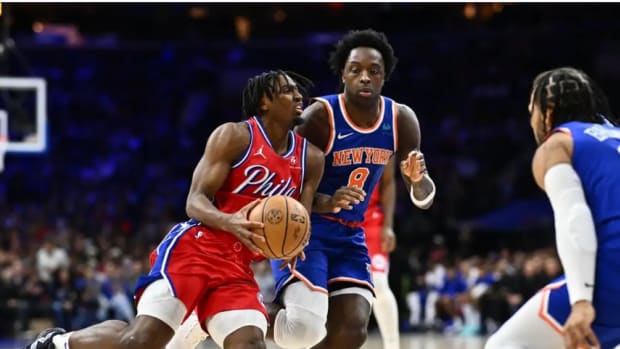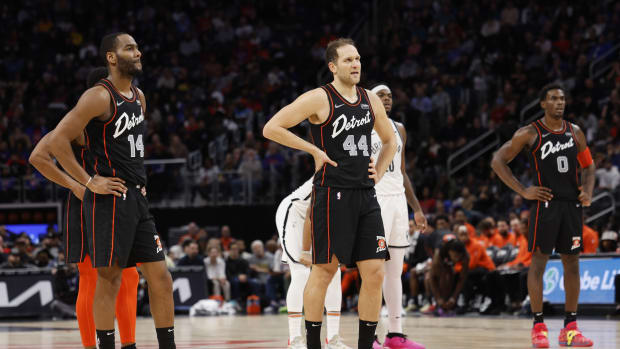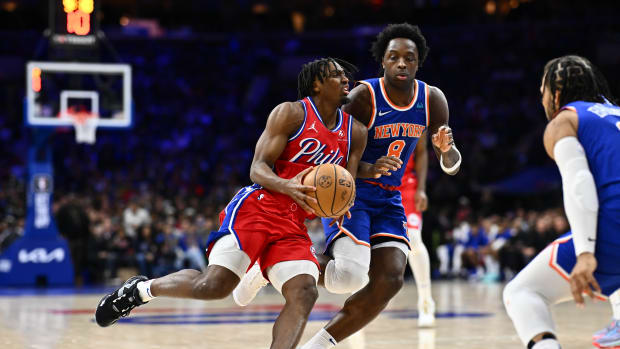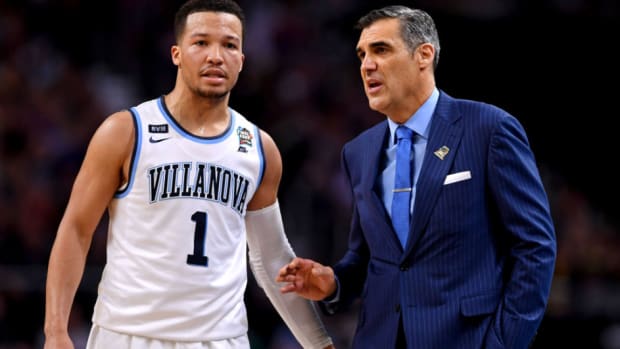Keep or Cut: Elfrid Payton
The Knicks' new front office has many tests in front of it — hiring a new coach, executing the 2020 draft properly, returning the team to relevancy, attracting a free agent or two — but one of the biggest tests might be right on the roster.
Elfrid Payton came to the Knicks last offseason on a two-year deal worth about $16 million, with only $1 million guaranteed for the 2020-21 season. The Knicks have to decide right after the draft in October if they'd like to keep Payton or part ways.
I won't bury the lede in one of these articles, for once: the Knicks need to let Elfrid Payton go if they're looking to establish a new culture under the Leon Rose regime.
For starters, the man that likely played the biggest part in getting Payton to New York last summer — Scott Perry — is still with the team. Perry has shown a penchant for liking players that he's had at other stops in the NBA before, previously signing Mario Hezonja to a one-year deal in 2018-19 after he was let go from Perry's former team, the Magic.
Similarly, Perry took a shot on Payton last summer, hoping to have a second chance with one of his former draftees once again. Now, however, Perry is seemingly a transitional figurehead. Rose picked up his option for next season to remain the general manager, but has also hired the likes of Brock Aller, Walt Perrin and Frank Zanin in senior front office roles around Perry, implying that maybe Perry is just here to ease the transition of Mills' regime to the Rose regime before being sent on his way.
So purely from a political standpoint, showing Payton the door would send the message that Rose is going to be bringing in his own people, players included.
But even just from a practical standpoint, it makes sense not to pick up Payton's option.
Payton played in 45 games for the Knicks this year, starting 36 of them. All in all, the Knicks went 17-28 with Payton playing, and 14-22 when he started. Even just accounting for his starts, the Knicks played on a 32-win pace, which would have left them likely sitting at the ninth or 10th seed at season's end (the 8-seed Magic played at a 38-win pace this year prior to the shutdown).
Wins and losses are a weak stat as far as determining an individual player's value, but in the case of Payton, it undercuts something that has been true about the Knicks for the last several seasons — the Knicks, dating back to Phil Jackson's regime, have been bringing on veteran players in one-year "prove it" deals and giving them valuable playing time to play for their next (non-Knicks) contract, while sitting their young players.
When the Knicks sell this in the preseason and early-goings of the regular season, it's sold as a move that basically boils down to, "Hey, we're trying to see if we can actually compete for the playoffs!" Honestly, that's fine. Every team owes it to themselves and their fans to at least be open to the idea of starting off hot and trying to parlay that into a playoff berth.
When it gets infuriating to fans and observers of the Knicks, however, is when the Knicks reach the later stages of the season, are well-removed from playoff contention, and still insist on playing players with no future on the team big minutes. This season, Payton fit that bill in a big way.
While Taj Gibson started over Mitchell Robinson, Robinson was mostly given the opportunity to close games and play around 30 minutes a night to end the year. RJ Barrett was the only young player on the team that basically had an automatic starting spot and 30-plus minutes a night at his disposal. But it was at the point guard spot, headlined by Payton, where many criticized the Knicks' rotation decisions throughout the season.
Was Payton probably the best overall point guard on the Knicks' roster for stretches this season? Yes, without a doubt, as low of a bar as that may be. But was investing 30 minutes per game on Payton in 33 straight starts to end the season a move worth making, with Frank Ntilikina and Dennis Smith Jr. — both on rookie deals and extension-eligible this offseason — sitting on the bench a wise move? Not at all, especially for the final month of the season, when Rose was named as the new President of Basketball Operations for the Knicks (even if he technically didn't assume the role until six games before the end of the season) and it could reasonably be assumed that all or most of the one-plus-one players would be goners this offseason with a new regime in place.
On top of that, Payton just doesn't play a brand of basketball that meshes at all with Robinson and Julius Randle in today's three-heavy NBA. Payton managed a putrid 20.3% on his 3-pointers this season, combined with Randle's 27.3% and Robinson's [no data found, try again later] from deep. Jack Huntley recently wrote an article for Posting and Toasting and noted that the NBA has seven active players that have taken over 540 career attempts from three and shot under 30% overall — the Knicks employed two of them in Randle and Payton, playing them big starting minutes to boot.
It became abundantly clear to most people with eyes that the Payton/Randle pairing was not going to work from the get-go, yet that two-man pairing got the third-most minutes on the team (1035) over the course of the season, despite Payton missing 21 games and Randle missing two. Payton's bread and butter is attacking the paint and kicking out. Randle's is attacking the paint at all costs. Robinson's is running to the rim and dunking. That led to a lot of crowded paints for the Knicks over the course of the season.
Perhaps most important in the discussion about whether to pick up Payton's option is the impending 2020 draft. The Knicks will pick somewhere in the top 10, most likely in the 7-8 spot. This draft is loaded with contributors at the point/combo guard spot like LaMelo Ball, Killian Hayes, Tyrese Haliburton, Cole Anthony, Kira Lewis, Tyrese Maxey and more. Chances are, the Knicks will be targeting a point guard with their pick if one is available whose talent level fits their draft slot.
Keeping Payton would leave the Knicks with Payton, the draft pick, Ntilikina (in the final year of his rookie deal) and Smith Jr. (ditto). Taking minutes away from two players approaching the ends of their rookie contracts — and thus the time where a decision needs to be made about their long-term futures with team — while also taking valuable playing time away from a lottery pick, all in the name of giving minutes to a player in his contract year, is not good business for a rebuilding team.
Keep or cut: A very emphatic cut, Payton is neither a good fit on the court nor on the roster.



